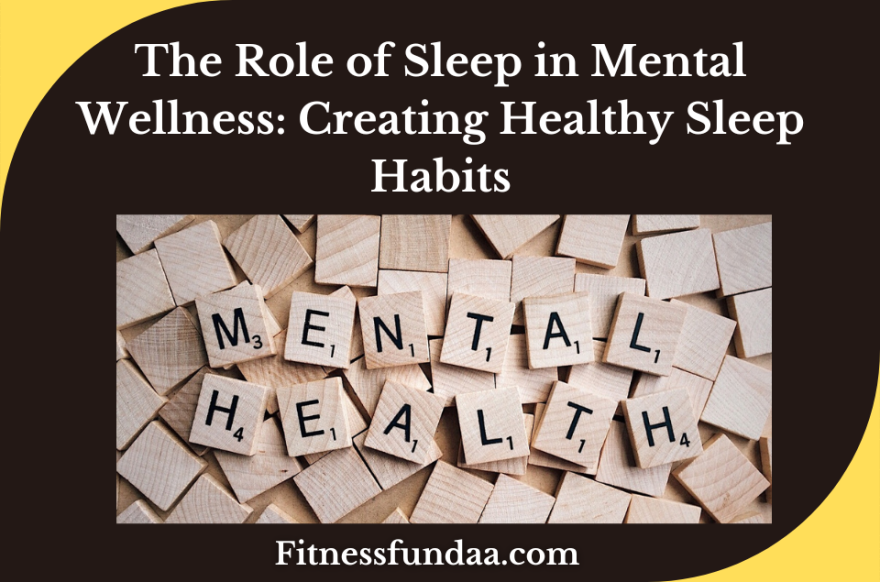In our modern world, most of the population struggles with their sleeping style which contributes a major role in their stressful life and mental health. In this article, we’ll explore the role of sleep in mental wellness and how to create healthy sleep habits.
Sleep’s Impact on Mental Wellness:
Adequate sleep plays a significant role in facilitating mental wellness through various means for instance quality sleep is crucial for cognitive functions such as memory consolidation, learning, and problem-solving as during sleep, the brain processes and organizes information acquired throughout the day, enhancing overall cognitive performance.
It also contributes to improved memory retention, allowing individuals to recall information more effectively which further enhances focus and decision-making abilities as they are linked to proper rest, ensuring mental sharpness and efficient cognitive processing.
Sleep quality directly influences emotional well-being as insufficient sleep can lead to heightened emotional reactivity, irritability, and mood swings. Emotional regulation is compromised when sleep is inadequate, impacting the ability to respond calmly to stressors and challenges. Good quality sleep serves as an antidote for stress resilience by providing the necessary physical and mental restoration.
During sleep, the body undergoes processes that regulate stress hormones, helping individuals better cope with daily challenges and emotional stressors. Quality sleep acts as a linchpin for effective stress management, allowing individuals to navigate life’s demands more resiliently.
Sleep Duration Guidelines:
Getting the right amount of sleep for respective ages is important for staying healthy both mentally and physically. Different ages need different amounts of sleep. For adults, it’s usually 7 to 9 hours each night. Good sleep your brain to function properly, reduces your stress, and keeps your emotions in check, which further helps in maintaining the healthy life of your body.
If you make a habit of sleeping the right amount every night, it’s like giving your body a good routine. This routine helps you sleep better and wake up feeling refreshed. When you get enough sleep, you’re better at thinking, you stay healthier, and you’re generally happier. It’s like giving your body the rest it needs to be its best self!
Sleep Architecture:
Think of sleep like a symphony, with different stages playing their unique tunes. Non-REM (NREM) and REM ( Rapid eye movement) stages create this beautiful melody. NREM helps your body recover, while REM is like a dreamy interlude. Your body needs to cycle through these stages to attain restorative sleep as your night’s rest. Picture your bedroom as the stage—keeping it comfy and quiet helps the sleep show run smoothly.
Circadian Rhythms:
Your body has its rhythm, a dance between day and night. This dance is called circadian rhythms, and it affects when you feel sleepy or awake. These rhythms play a significant role in influencing various physiological processes, including hormone production and body temperature. Syncing your sleep routine with this natural dance improves your sleep quality, making you feel more refreshed when you wake up.. Aligning sleep schedules with circadian rhythms promotes more restful and efficient sleep.
This synchronization optimizes the body’s performance during waking hours and contributes to overall mental well-being. Strategies such as exposure to natural light during the day and maintaining a consistent sleep schedule can help regulate circadian rhythms. It’s like dancing with your body’s internal clock for a better night’s sleep.
Impact of Sleep Deprivation:
Not getting enough sleep is like asking your brain to perform without a full rehearsal. It messes with your thinking, makes you moody, and, over time, can even affect your mental health. It’s like trying to run a marathon without enough energy – your overall well-being takes a hit.
Creating a Sleep-Inducing Environment:
Imagine your bedroom as a cozy retreat. Dark curtains, a comfy bed – it’s the backstage setting for a great night’s sleep. A clutter-free space ensures smooth transitions between sleep stages, making your sleep performance top-notch.
Bedtime Routine:
Having a bedtime routine is like sending a signal to your body – “Time to wind down!” Reading a book, taking a warm bath – these are the calm moments before your sleep show begins. And yes, turning off screens is a must! It’s like dimming the lights before a soothing performance.
Limiting Stimulants:
Think of caffeine as a backstage pass to alertness. But, if you use it too close to bedtime, it’s like having the wrong act on stage, disrupting your sleep performance. The same goes for those electronic devices emitting blue light – they can mess with your sleep script.
Physical Activity:
Exercise is your body’s way of rehearsing for a good night’s sleep. It promotes relaxation and reduces stress. Just make sure to schedule your exercise time earlier in the day so that your body is ready to rest when the curtain falls.
Stress Management Techniques:
Life can be stressful, like a plot twist in your sleep story. That’s where stress-reducing practices come in – think of them as your sleep superheroes. Mindfulness, meditation, or deep breathing – they help you manage stressors that could otherwise steal the spotlight from your sleep.
Professional Help:
If your sleep story hits a rough patch, seeking help is like bringing in a director to guide the plot. Persistent sleep issues or mental health challenges may require professional assistance.
Healthcare providers can offer personalized guidance, conduct assessments, and address underlying issues contributing to sleep disturbances. Seeking timely help is crucial for managing sleep-related concerns and maintaining overall well-being. Healthcare professionals can assess, offer personalized advice, and address any underlying issues. It’s like having a sleep expert fine-tune your performance.
Consistency is Key:
Consistency in your sleep patterns makes your sleeping schedule habitual for you which further helps you to attain the benefits of a good sleep cycle. Imagine your sleep routine as the script for a hit show. Consistency, like sticking to a regular schedule, ensures the performance flows smoothly. It’s like telling your body, “This is when the show starts, and this is when it ends.” Consistency is the secret ingredient for a standing ovation – a night of great sleep!
In conclusion, the impact of sleep on mental wellness is more than we could have ever think of as it plays a significant role in fostering cognitive functions, emotional well-being, and stress resilience. Quality sleep enhances cognitive performance by facilitating memory consolidation, learning, and effective problem-solving. The importance of sleep duration guidelines, particularly for adults needing 7-9 hours per night, becomes evident in supporting overall health, maintaining cognitive sharpness, and promoting emotional balance.
The analogy of sleep as a symphony and the consideration of circadian rhythms highlight the intricate dance between different sleep stages and the body’s natural internal clock. Aligning sleep patterns with these rhythms ensures more restful and efficient sleep, contributing to enhanced mental well-being.
Additionally, recognizing the adverse effects of sleep deprivation on cognitive functions and emotional regulation underscores the necessity of prioritizing adequate sleep for a healthy mind. Creating a sleep-inducing environment, following a consistent bedtime routine, and limiting stimulants contribute to optimizing sleep quality and promoting overall mental health.
In essence, sleep is not merely a nightly routine but a dynamic process that deeply influences our mental and emotional resilience. As we acknowledge the symphony of sleep architecture, the rhythm of circadian cycles, and the consequences of sleep deprivation, we gain insights into the profound impact of sleep on our overall mental wellness. Embracing healthy sleep habits becomes an essential aspect of nurturing a balanced and resilient mind, providing the restorative foundation for a fulfilling and vibrant life.
FAQs: Sleep and Mental Wellness
How does sleep impact mental wellness?
It directly influences emotional well-being, with good sleep serving as an antidote for stress resilience by facilitating physical and mental restoration.
What is sleep architecture?
Think of sleep as a symphony with different stages, including Non-REM (NREM) and REM (Rapid Eye Movement). NREM helps the body recover, while REM is like a dreamy interlude. To achieve restorative sleep, your body needs to cycle through these stages. Creating a comfortable and quiet sleep environment is essential for a smooth “performance.”
How do circadian rhythms affect sleep?
Circadian rhythms are your body’s natural dance between day and night, influencing when you feel sleepy or awake. Aligning your sleep routine with these rhythms improves sleep quality, making you feel more refer
How can I create a sleep-inducing environment?
Imagine your bedroom as a cozy retreat. Dark curtains, a comfortable bed, and a clutter-free space ensure smooth transitions between sleep stages, contributing to top-notch sleep performance. A conducive sleep environment promotes better overall sleep quality.
Why is a bedtime routine important for sleep?
A bedtime routine signals to your body that it’s time to wind down. Calming activities like reading a book or taking a warm bath create calm moments before your sleep “show” begins. Turning off screens is a must, akin to dimming the lights before a soothing performance.
What stimulants should I limit for better sleep?
Caffeine, often seen as a backstage pass to alertness, should be used cautiously, especially close to bedtime. Electronic devices emitting blue light can disrupt your sleep script. Limiting these stimulants supports a smoother sleep performance.
What stress management techniques can aid sleep?
Stress-reducing practices like mindfulness, meditation, or deep breathing act as sleep superheroes. They help manage stressors that could otherwise steal the spotlight from your sleep, ensuring a more peaceful and restful night.
When should I seek professional help for sleep issues?
Persistent sleep issues or mental health challenges may require professional assistance. Healthcare providers can conduct assessments, offer personalized guidance, and address underlying issues contributing to sleep disturbances. Seeking timely help is crucial for managing sleep-related concerns and maintaining overall well-being.

